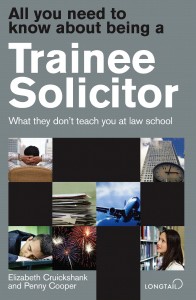“Having a strong sense of ethics is a fundamental part of being a lawyer.”
Someone will say that, or something very similar, to you during your time at Law School. “Ethics” has its origins in the Greek word for moral character. But what does it really mean in practice?
Basic honesty

Consider your own moral character and how it was formed. As you grew up you would have been confronted with many situations where you had the opportunity to “acquire” things which belonged to other people – perhaps it was the small change you “forgot” to give your mother after you did some shopping for her, the tennis racquet you found lying on a park bench and did not take to the police station or the extra £10 you were given because a shop assistant thought you had given her a £20 note rather than a £10 one.
All three actions could come within the legal definition of theft, although you might easily take the view that the second two were simply your “good luck”. You might also succeed in convincing yourself that your “crime” in the third example was victimless. But wait a bit…
A healthy functioning society relies on individuals being able to see beyond their own wishes and needs and acting fairly towards others most of the time. The tennis racquet could have been purchased with three months savings by a 13 year old who was just about to play in his first tournament. And now can’t do so. The shop assistant will be short on her takings and the shortage could well be taken out of her wages.
A step further
As a lawyer you could find yourself tempted into doing things which might seem like a good idea at first blush, but if you stopped to think things through you would quickly realise that their consequences could be very much more serious.
- You realise that a document must be signed by your supervisor and sent to the client to-day, but he has rushed out to an urgent meeting with another client and you don’t know if he will be back before the last post. Should you consider “copying” his signature on the document? The answer is very definitely in the negative.
- Should you use your commuting time to read papers relating to your client’s position so that you can be better prepared for a meeting the next morning? Again the answer is NO. You simply don’t know who is sitting beside you on the train or the underground and what they could pick up by reading your papers over your shoulder.
Casual actions, which seem to you like an efficient way to cut a corner and perhaps relatively trivial, can have very nasty consequences, especially when they involve a breach of your professional code of conduct.
– Your supervisor and your firm will take an extremely dim view if your “initiative” involves falsifying a document.
– They will be equally appalled if a passenger reports you to your firm (it has been known). What if the papers related to a redundancy situation that had not been discussed with the company’s unions and a union official was sitting next to you? What if they concerned the divorce of a celebrity client and you were sitting next to a journalist? As a lawyer you will often be in possession of confidential information; it is imperative that you remember the duty of confidentiality you owe to the clients who gave you that information.
Really criminal

By not thinking ahead and imagining the consequences of the actions described in the first two paragraphs you are likely to annoy, disappoint or inconvenience other people, and your career may not survive.
As a lawyer you may have opportunities to advantage yourself at other people’s expense and certainly some lawyers find the temptation to facilitate mortgage fraud or money-laundering just too strong. Many more have found themselves in trouble through using clients’ money for their own benefit. Often the justification is that it is only a short term expedient to tide them over a rough patch. But then they find that they can never find the money to reimburse the client account. Or perhaps they have found siphoning money from client account all too easy, especially when they are acting in a position of trust for a vulnerable but wealthy client.
And they do get away with it. For a time. The SRA reports reveal that dishonest lawyers can embezzle reasonably substantial sums — £26,000, £50,000, even £750,000. But if you compare these amounts with what an honest lawyer could earn over a life-time, their value does somewhat diminish compared with the potential damage to self-esteem, career prospects and even freedom.
 The potential consequences of being unethical include, in the most serious cases, being struck off the Roll. You would then be unable to earn your living from the profession that you worked so hard to enter and with possibly a prison sentence to boot if your actions are also criminal. It’s much better to fine tune your moral compass now and to reject any thoughts of easy pickings as a lawyer. It is not unusual to come across situations when you are unsure what to do. When this happens ask a more experienced colleague for advice or contact the SRA Helpline for ethical guidance. Simply “forgetting” to do the right thing is no longer an option.
The potential consequences of being unethical include, in the most serious cases, being struck off the Roll. You would then be unable to earn your living from the profession that you worked so hard to enter and with possibly a prison sentence to boot if your actions are also criminal. It’s much better to fine tune your moral compass now and to reject any thoughts of easy pickings as a lawyer. It is not unusual to come across situations when you are unsure what to do. When this happens ask a more experienced colleague for advice or contact the SRA Helpline for ethical guidance. Simply “forgetting” to do the right thing is no longer an option.
Elizabeth Cruickshank and Professor Penny Cooper of The City Law School are the authors of ‘All you need to know about being a Trainee Solicitor’ (Longtail, 2008) and together with Boma Ozobia of “The Survival Manual for New Wigs” (Odade 2010).

Good points and refreshing to hear someone taking a hard line on this. Now how is the lawyer to act when the dishonesty is institutional? …
A friend of mine worked as a paralegal for a largish City legal firm and was regularly expected to “meet targets” by billing clients for time units which they didn’t use. He found this practice quite repugnant and got out ASAP and found a better job with a more reputable company, but I suspect this practice is quite widespread. Would you be willing to take a stand against this sort of dishonesty, even if it cost you your hard-won job?